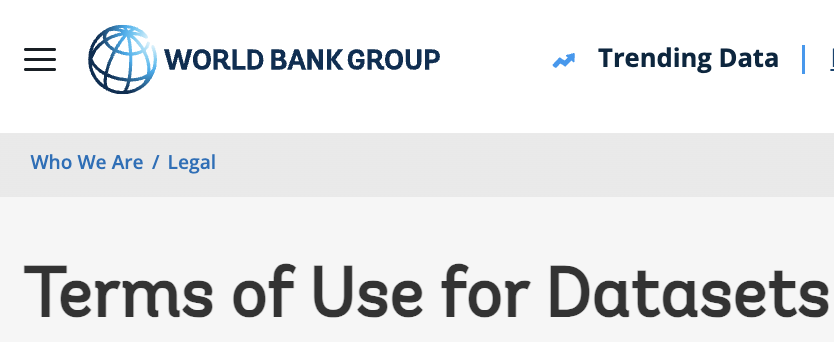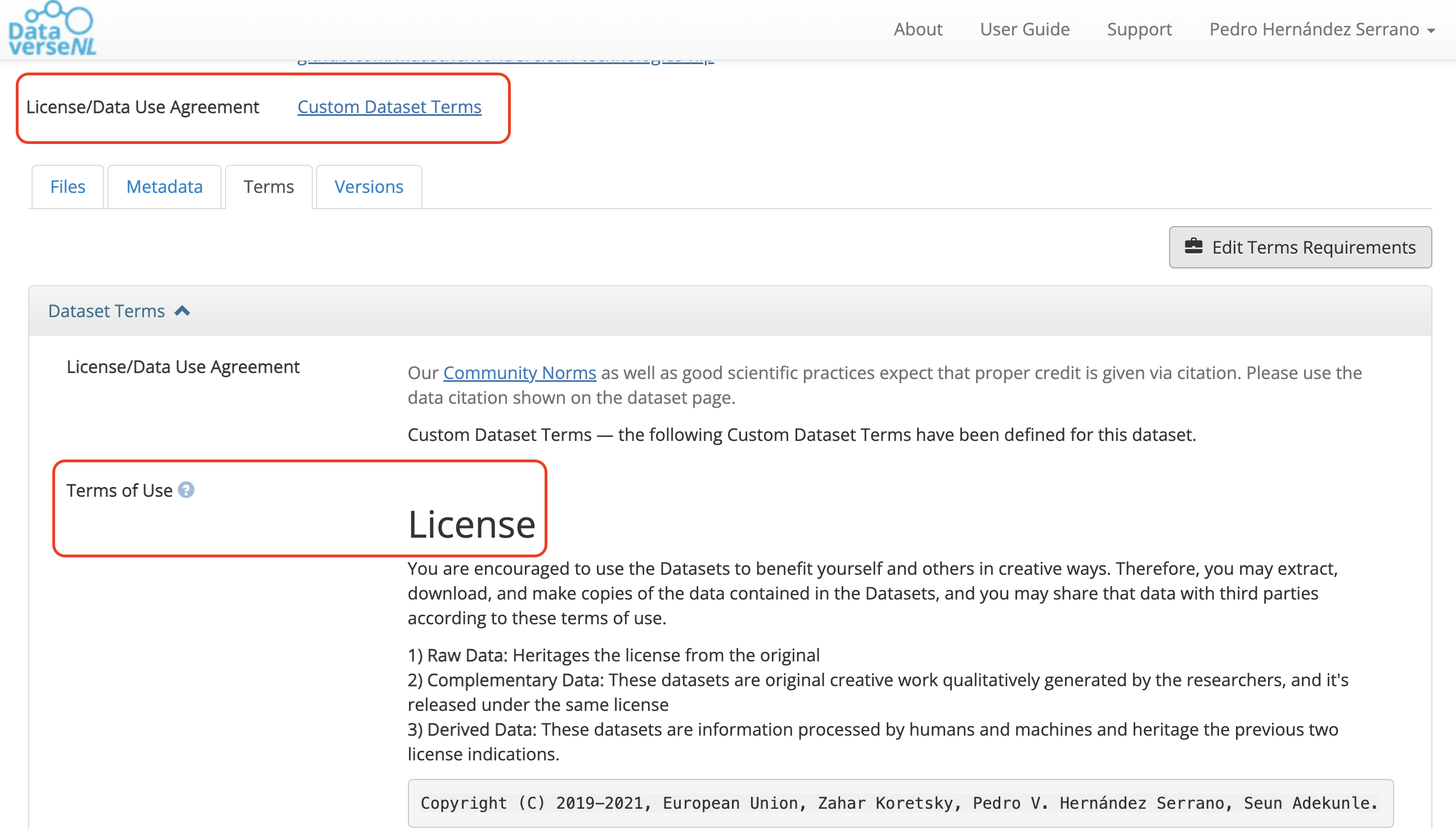1. Set up your own terms
Overview
Teaching: 10 min
Exercises: 15 minQuestions
1 What are Data Terms of Use?
2 What must a Data Terms of Use statement contain?
3 What format should Data Terms of Use be?
4 Are there standard Licenses we can pick from?
Objectives
The participant will understand what data terms of use are with examples.
The participant will be able to create basic data terms of use.
FAIR principles used in Data Terms of Use:
Accessible
FM-A2 (Metadata Longevity) → doi.org/10.25504/FAIRsharing.A2W4nz
Reusable
FM-R1.1 (Accessible Usage License) → doi.org/10.25504/FAIRsharing.fsB7NK
1 What are Data Terms of Use?
Data Terms of Use is a textual statement that sets the rules, terms, conditions, actions, legal considerations, and licenses that delineate data use.
An example is:

The World Bank - Terms of Use for Datasets → LINK TO EXAMPLE
Looking at the example, we can identify general elements in the Data Terms of Use statement. For instance, a broad description of the data is referred to, but also under what type of license the user is allowed to reuse.
Sometimes as part of our research, we use commercial databases. We should be careful always to read the conditions for using it for research purposes.
An example is:

Terms of Use - Numbeo.com → LINK TO EXAMPLE
We can see that clause 3 of Licensing of content requests work attribution.
2 What must a Data Terms of Use statement contain?
As a general rule, a Data Terms of Use statement must contain at least the following:
| Section | Description | Example |
|---|---|---|
| Description | What is this statement about and what Digital Objects are referred to | The following Terms of Use statement is about my happy dataset |
| License | Statement under which conditions a requester is allowed to use the data source | The happy dataset is of Public Domain |
| Work attribution | Statement requesting citation of the data source used | Could you please cite my happy dataset? |
| Disclaimer | Any consideration that the requester should be aware of | The last 100 records of my happy dataset might have selection bias |
Nevertheless, depending on the use case, the “Data Terms of Use” statement can be extended by adding specific clauses when complex data, multiple databases, or sensitive data are involved. After all, the “Data Terms of Use” statement is the legal basis of the referred data source. i.e., in the light of public law, you can make someone liable for not complying with specific clauses of the statement.
Moreover, sometimes our work is conducted within the context of a greater scientific funded project. Therefore, it is always recommended to check with the Principal Investigator or Project Manager whether the Data Terms of Use statement is to be defined or if there is already a Data Policy framework.
An example is:
Policy for use and oversight of samples and data arising from the Biomedical Resource of the 1958 Birth Cohort (National Child Development Study) → LINK TO EXAMPLE
- Link to the original Data Policy
This policy framework creates comprehensive guidelines on handling data for that specific study involving children’s data. Therefore, the researchers working underneath the project do not have to make new Data Terms of Use.
“Data Terms of Use” statement is the legal basis of the referred data source
In the light of public law, you can make someone liable for not complying with specific clauses of the statement.
3 What format should Data Terms of Use be?
The Data Terms of Use is a plain text statement. This text has the length and depth that the data owner or data manager sees fit. There is no right or wrong when drafting it. Usually, it is recommended to store this textual statement in a README file, using an accessible format, for example, .txt, .md, or .html so that any user can read it without needing any additional software.
The Data Terms of Use is a plain text statement written in a machine-friendly format
The “Data Terms of Use” can be drafted using any application (e.g., MS Word). However, it’s important to store it in a machine-friendly format such as
.txtor.md
Any text editor software would do the trick, such as Notepad++ or Sublime Text, but also you can write it using Microsoft Word or Google Docs and save it as .txt
Exercise - Level Medium 🌶🌶
- Visit the landing page of the following terms of use github.com/CityOfPhiladelphia/terms-of-use/blob/master/LICENSE.md
- Can you tell what type of data it is about?
- Can you tell in what format the terms of use are written?
- What platform are they using to put it?
Solution
- Refers to the public code on which the large city of Philadelphia government is based (https://www.phila.gov/)
- The format is Markdown (
.md)- They used Github to put the
LICENSE.mdfile, which is the Data Terms of Use.
The Data Terms of Use needs to be in the same root folder as the data source. When it comes to a database - like the World Bank example - it should be findable on the project’s website. Moreover, if there is no official project website, you should include it in .md format in a Github repository like the following example: → LINK TO EXAMPLE

In Episode 4 (Data Archiving), we will explore that some data repositories such as DataverseNL allow you to create a Data Terms of Use statement directly on the platform when you create a data project.
By default, you get a waiver License CC0 “No Rights Reserved”. Putting a database or dataset in the public domain under CC0 is a way to remove any legal doubt about whether researchers can use the data in their projects. Although CC0 doesn’t legally require data users to cite the source, it does not affect the ethical norms for attribution in scientific and research communities. Moreover, you can change this waiver to a tailored Terms of Use you have created for your data.

Exercise - Level Easy 🌶
Is it possible to edit the Terms of Use in DataverseNL?
Go to DataverseNL/ to the FAQ section to find out.
Solution
Yes, it is possible. However, you can’t choose it at the beginning. After creating a dataset, go to the ‘Terms’ tab on your dataset page and click ‘Edit Terms requirements’. Next, select the radio button ‘No, do not apply CC0 public domain dedication’, and fill in the text fields with your terms and conditions.
Dataverse also provides Sample Data Usage Agreement → LINK
4 Are there standard Licenses we can pick from?
Yes, there are two general License frameworks that can work for data.
Creative Commons (CC) provides several licenses that can be used with a wide variety of creations that might otherwise fall under copyright restrictions, including music, art, books, and photographs. Although not tailored for data, CC licenses can be used as data licenses because they are easy to understand. Its website includes a summary page HERE outlining all the available licenses, explained with simple visual symbols.
| Permission Mark | What can I do with the data? |
|---|---|
| BY | Creator must be credited |
| SA | Derivatives or redistributions must have an identical license |
| NC | Only non-commercial uses are allowed |
| ND | No derivatives are allowed |
Open Data Commons (ODC) provides three licenses that can be explicitly applied to data. The web pages of each of these licenses include human-readable summaries, with the ramifications of the legalese explained in a concise format.
Exercise - Level Easy 🌶
Pick a License at creativecommons.org with the following conditions:
- Others cannot make changes to the work since it’s simulation data
- If someone wants to use the simulation data for a startup, they can Question: What type of license is it?
Solution
Attribution-NoDerivatives 4.0 International
Discussion
Scenario:
You are a sociology and statistics researcher, and now you are collaborating with a researcher from the hospital. Your collaborator researches Children’s Mental Health. You will combine expertise and conduct a study on the Quality of Life in Children. In addition, you will lead a national survey in Dutch schools. You are thinking of collecting information about bullying, social media, and family structure.Discuss with your team what considerations need to be taken into account when drafting a Data Terms of Use for this study. Do you think a legal expert must write the terms of use, or can it be done by the researchers?
Key Points
The Data Terms of Use statement is the legal basis of the referred data source.
A License is the bare minimum requirement for Data Terms of Use.
If a standard License does not fit your project, then you can use Terms of Use layouts e.g. Sample Data Usage Agreement.